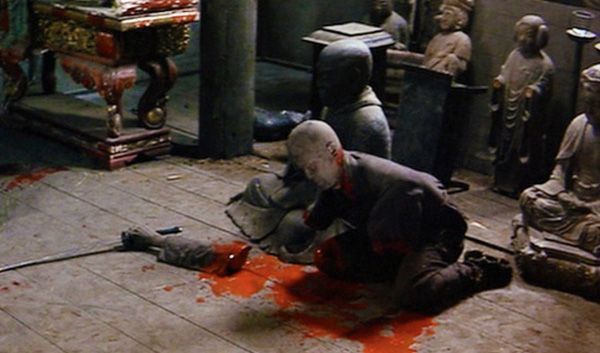Eye For Film >> Movies >> Lone Wolf And Cub: Baby Cart In Peril (1972) Film Review
Lone Wolf And Cub: Baby Cart In Peril
Reviewed by: Jennie Kermode

The fourth part of the Lone Wolf And Cub/Baby Cart/Sword Of Vengeance series marks a departure from it predecessor both in style and tone. Visionary director Kenji Misumi, who steered it through the first three films, is now gone. In his place we have Buichi Saitô, who wisely imposes his own style from the start. It's the right point in the series for this to happen, because subsequent to the episodic meandering of the earlier films, the series is entering a more thoughtful stage as the meta-plot starts to tighten up. A testing encounter for young Daigoro (Akihiro Tomikawa) foreshadows the series' final conflict. The focus is on narrative as much as action, and both leads get to do more real acting than they did in the first three films put together.
The choice of Tomikawa to play the series' infant hero must go down as one of the most fortuitous pieces of casting in the history of cinema. less that one year old when he first played Daigoro, he is, by this stage, walking and talking, and finally gets a heroic sequence of his own, after getting lost and encountering a dangerous samurai. The samurai remarks on his remarkable eyes, which look upon danger with no hint of fear (presumably he has never been a parent and doesn't realise that toddlers wander into all sorts of perilous situations without apparently caring). What could have been a cutesy distraction becomes a compelling part of the larger fable thanks to Saitô's willingness to film the child as if he were an older character, with few emotive close-ups, positioning him in the context of a wider world full of dangers both natural and human. It's a world he must face sooner or later, so why not now? his father, Itto Ogami (Tomisaburô Wakayama) has been preparing him for this. The look in the father's eyes when he finds him is the first real indication we get of the intensity of the bond between them, a brief suggestion that he wishes there were another way.

The Ogamis' story is paralleled by another tale or parent and child in this film, as Itto accepts a mission to assassinate a young woman who has betrayed her clan. Oyuki (Michi Azuma) has a tragic backstory of her own, and her presence atones somewhat for the lurid rapes in the earlier films, as it is an experience like this (much more considerately filmed) that has inspired her to embark on a vendetta and to become an outsider. The respect that develops between her and Itto, as he recognises their similar fates, gives the film an emotional depth not present since the first in the series. It is also apparent that he respects her skill as a warrior, and we see impressive sword fighting from both performers before reaching their final showdown.
Saitô is a much more confident director than Misumi when it comes to action. He doesn't turn in quite so many striking set pieces, though the influence of the original manga art provides a thread of visual continuity through all the films, but he gets in much closer to the action, and this film is probably the best in the series when it comes to swordplay. As in its immediate predecessor, Itto ultimately has to take on a large group of foes, but here events are portrayed more realistically without ever making it seem that what we are watching is impossible. Wakayama is a master of his craft and Saitô knows how to show that off at its best.
Along with the elegant sword fights on display here, there are some sillier combat scenes, with Daigoro pulling off one trick that will have audiences cheering. Although we spend much of our time on lonely hillsides or under smoke-stained skies, the palaces of the lords we visit are beautifully outfitted and the costuming throughout is superb, right down to the details of Oyuki's elaborate tattoos. Saitô's film makes astute use of contrast throughout. Baby Cart In Peril doesn't have Misumi's flair but it is in many ways a stronger film.
Reviewed on: 17 Mar 2017
















